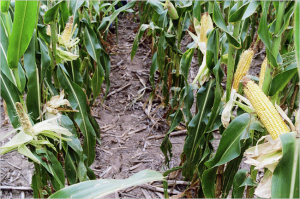Drought tolerance is the holy grail in crop improvement these days. We are running out of water; cannot easily expand irrigation; poorer farmers are affected most by it; and climate change will make things worse (etc.).
Breeding for drought tolerance has not been very successful. For lack of trying? Many years of work at CIMMYT seem to be paying off. Or is it just too damn difficult because of the multiple genes involved (from stomatal regulation to root growth), and the multiple droughts (when, how long, how much) to deal with.
 Can biotech come to the rescue? This New York times article suggests that big companies and single genes may do the trick. I have to see it before I believe it, something like this picture, which shows drought-resistant corn on the right, tested next to “traditional” corn plants in Nebraska, USA. I want to see that picture in the fields of African farmers.
Can biotech come to the rescue? This New York times article suggests that big companies and single genes may do the trick. I have to see it before I believe it, something like this picture, which shows drought-resistant corn on the right, tested next to “traditional” corn plants in Nebraska, USA. I want to see that picture in the fields of African farmers.
Or should farmers who cannot grow maize because of drought start thinking of another crop? Why not grow sorghum?
 Can biotech come to the rescue? This
Can biotech come to the rescue? This